牛津译林7BUnit2练习版学案与课后巩固习题
牛津译林版7BUnit2教案7课时

牛津译林版7B Unit2 教案 7课时一、教学内容二、教学目标1. 能够听懂、会说、会读、会写描述天气的词汇和句型。
2. 掌握一般将来时的用法,能够运用该时态描述未来的天气情况。
3. 提高学生的英语口语表达能力,培养合作学习的精神。
三、教学难点与重点教学难点:一般将来时的用法,描述天气状况的词汇。
教学重点:能够熟练运用目标语言询问和回答天气情况,掌握一般将来时的结构。
四、教具与学具准备1. 教具:多媒体设备、黑板、教学卡片等。
2. 学具:英语课本、练习本、彩色笔等。
五、教学过程1. 导入:通过播放一段关于天气的视频,引导学生关注和讨论天气话题。
2. 新课内容呈现:教师展示Comic strip,引导学生学习描述天气的词汇和句型。
3. 例题讲解:教师讲解一般将来时的用法,并给出示例。
4. 随堂练习:学生进行小组活动,用目标语言询问和回答天气情况。
5. 小组讨论:学生分组讨论如何用一般将来时描述未来的天气。
6. 展示环节:每组选代表进行展示,其他同学给予评价。
六、板书设计1. Unit2 What will the weather be like?2. 主要内容:天气词汇:sunny, cloudy, rainy, windy, snowy等。
句型:What will the weather be like? Will it be ?一般将来时:will + 动词原形七、作业设计1. 作业题目:A: cloudy, B: rainy, C: sunny, D: windye.g. Tomorrow it will be (C).(2) 编写一段对话,询问和回答未来几天的天气情况。
2. 答案:(1) 略(2) 略八、课后反思及拓展延伸1. 反思:关注学生在课堂上的参与度,针对不同学生的学习情况,进行个别辅导。
2. 拓展延伸:(1) 鼓励学生在课后关注天气预报,运用所学知识描述天气。
(2) 组织学生进行天气主题的英语角活动,提高学生的英语实际应用能力。
泽林牛津版7B Unit2课时练习和单元试卷含答案

第二单元综合检测卷一、单项选择(每小题1分,共15分)( )1. My mother wants me to be office worker, but I would like to be a volunteer to work for ______old people.A. an; anB. an; theC. a; theD. a; an( )2.Mum,my mobile phone is________.I want to buy a new_______.A.broken;it B.broke;one C.broke;it D.broken:One( )3.一What do you often do in your free time?一I have some hobbies like________.I often do some_________when I am free.A.read;reading B.reading;read C.to read;read D.reading:reading( )4.V olunteers share their skills and help people ______the neighbourhood _______different problems.A.with;with B.in;in C.with;in D.in:with( )5.I must thank Andy ________helping me so much_________my Chinese.A.with;for B.for;for C.for;with D.with:with( )6.一What are your neighbours like? 一__________A.They are like my friends.B.They are friendly and helpful.C.They like playing sports.D.They are workers arm waiters.( )7. Meimei's father is a in a restaurant.A. doctorB. teacherC. nurseD. cook( )8. The girl goes jogging fit every day.A. to keepB. keepingC. keepD. keeps( )9. Tomorrow will be my sister's birthday. I'll as a present.A. give her a bookB. give a book for heC. give her for a bookD. give a book her( )10. ─ Would you please find to tell us? ─ All right.A. something interestingB. interesting somethingC. anything interestingD. interesting anything( )11.─ Dinner is ready. Help yourself!─ Wow! It delicious. Could you please tell me how to cook it?A. tastesB. looksC. soundsD. feels( )12. ─ Is Jack going to see a film in a few minutes? 一No. He to the teachers' office.A. will goingB. goesC. goD. is going( )13. If you are tired, you'd better have a good rest. It will make you better.A. to feelB. feelsC. feelingD. feel( )14. ─ you free next Monday? I'm not cure. If I have time, I'll call you.A. Are; beB. Will; beC. Do; beD. Are; going to( )15. ─ There two football matches in the sports centre next week. —Great!A. is going to haveB. will haveC. is going to beD. are going to he二、完形填空(每小题1分.共10分)Do you know your grandparents well? Are they happy?1 people in Yangzhou are happy. In the morning you can see old people play sport in the park. Mr and Mrs Chen are always2 them. They say they are3 after their sons and daughters go to work andgrandchildren go to school. Mrs Chen is in a Yang Opera(扬剧)Club. So she learn to sing opera in the 4 . It's really interesting. Mr Chen is in a( n) 5 club. There he can run, swim and play ball games. Their friends Mr and Mrs Zhang aren't in 6 clubs. They play computer games at home because they want to learn 7 about their grandchildren. Their grandchildren all love them very much. These days some old people want 8 a Shopping Club. In the club they can talk about how to buy things at a(an) 9 price.How happy the old people in Yangzhou are!Your grandparents well? Are they happy? They all think they are lucky to live in a place 10 Yangzhou. ( )1.A. Old B. Young C. Small D. Big( )2. A. for B. Among C. between D. with( )3. A. lonely B. happy C. excited D. busy( )4. A. class B. team C. club D. group( ) 5. A. art B. sports C. music D. English( )6. A. no B. any C. some D. not( )7. A. a lot of B. lots of C. a lot D. lot of( )8. A. having B. to have C. have D. has( )9. A. high B. expensive C. cheap D. good( )10. A. look B. look like C. seem like D. like三、阅读理解(每小题2分.共30分)AWe can see walls everywhere in the world. But the Great Wall of China is the longest one of all. The Chinese call it "The Ten-thousand-li Great Wall". I n fact, it's more than 8,000 kilometres long. It’s 4~5 metres wide. In most places, five horses or ten men can walk side by side. When you visit the Great Wall, you want to know how the Chinese people were able to build such a great wall thousands of years ago. Without modern machines, it was really very difficult to build it. They had to do all the work by hand. It took millions of men hundreds of years to build it. The Great Wall has a history of over two thousand years. The kings began to build the first parts of it thousands of years ago. Then Qin Shi Huang had all the walls joined up(连起来).He thought that could keep the enemies(敌人)out of the country. Today the Great Wall has become a place of interest. Not only Chinese people but also people from all over the world come to visit it.( )1.The Great Wall is the longest wall in .A. ChinaB. AmericaC. the worldD. Japan( )2. How long is the Great Wall?A. It’s less than eight hundred kilometres.B. It’s more than eight million kilometres.C. It’s eight thousand kilometres.D. It’s over eight thousand kilometres.( )3. It took men years to build the Great Wall.A. millions; millionsB. hundreds of; hundreds ofC. millions of; hundreds ofD. hundreds of; millions of( )4.The Great Wall was built .A. by people all over the worldB. without modern machinesC. with some other countries' helpD. by all the Chinese kings( )5. Qin Shi Huang thought the Great Wall could .A. keep the enemies out of his countryB. keep his body in itC. welcome all the peopleD. make his country beautifulBParis is a very beautiful city but I won't call it the most romantic(浪漫的)city at all! It is difficult to find a hotel! That is quite funny. Some policemen help us and then we find a hotel! The hotel is on the sixth floor andit is tiring to climb up the stairs! The room is very simple but it has a big bathroom. We go out for a walk to visit the city. The Louvre Museum is our favourite one. There are some wonderful pieces of art there. The Eiffel Tower looks so cool from a far place, but when we get close to it, it doesn’t look so good. We also don't feel happy about the expensive food. Most of the time we enjoy Paris, but the weather is not always good. It often rains. We feel a little troublesome because few people can speak English and we can't speak French. But I'm still glad because this is just the beginning of our travel.( )6.Who helps the writer find a hotel?A. Some students.B. Some policemen.C. Some workers.D. Some farmers.( )7.There is a big in the room of the hotel.A. bedroomB. living roomC. bathroomD. kitchen( )8. What does the Eiffel Tower look like from a far place?A. Cool.B. Short.C. Ugly.D. Bad.( )9. The underlined word "simple" means ““in Chinese.A.简陋的B.复杂的C.容易的D.奢华的( )10. The passage mainly(主要)tells us .A. Paris is not a good place to travelB. the writer is looking for a good hotelC. the writer starts travelling from ParisD. it is important for people to speak FrenchC11. Yu Wei will meet Ren Xue at the school gate .A. at 8:00, on May 23B. at 8:00, on May 24C. at 16:00, on May 23D. at 16:00, on May 2412. Tomorrow Yu Wei and Ren Xue will probably .A. go hikingB. go to a partyC. go to the moviesD. join the Sunshine Club13. Which number can Maria call at if her MP5 is lost?A. 84676352.B. 87539683.C. 87539682.D. 87058344.14. Which of the following people is allowed to join the club?A. A 10-year-old kid.B. A 14-year-old boy.C. A 19-year-old student.D. A 30-year-old parent.15. We can know that the clubA. is on Land StreetB. costs 35 yuan a weekC. opens once a weekD. is open for four hours a week四、词汇(每小题1分,共20分)A.根据句意及首字母、英文或汉语提示完成单词。
牛津译林版7BUnit2教案7课时

1.重视学生的反馈意见,了解他们的学习需求和困难。
2.根据学生反馈,调整教案和教学方法,提高教学质量。
五、课后拓展
1.提供课后学习资源,鼓励学生自主学习和拓展知识。
2.定期检查作业完成情况,关注学生的进步和问题。
②词汇:讲解本课所学的词汇和短语,并通过例句展示其用法。
③阅读理解:阅读文章"The life of a teenager",回答相关问题,提高阅读能力。
④听力:听录音,完成课后练习,巩固现在进行时的用法。
3.课堂互动:
①小组活动:学生分成小组,用现在进行时讨论组内成员的日常活动。
②个体展示:邀请学生上台展示自己的日常活动,锻炼口语表达能力。
2.拓展延伸:
①鼓励学生课后观察周围人的日常活动,用现在进行时进行描述。
②推荐阅读:关于青少年生活的英文文章,提高阅读水平,拓展知识面。
重点和难点解析
1.教学难点:现在进行时的构成和用法
2.词汇的灵活运用
3.阅读理解的提高
4.听力练习的巩固
5.课堂互动的开展
6.作业设计
一、现在进行时的构成和用法
现在进行时是本节课的语法重点,其构成是“主语+ be动词(am/is/are) +现在分词”,用于描述正在进行的动作或状态。在教学中,要强调以下要点:
牛津译林版7B Unit2教案7课时
一、教学内容
本节课选自牛津译林版7B Unit2,主要涉及以下章节内容:Grammar:Present continuous tense;Vocabulary:words and phrases about daily activities;Reading:The life of a teenager;Listening and speaking:Talk about daily routines and plans.
牛津译林版七年级英语7BUnit2同步练习(有答案)
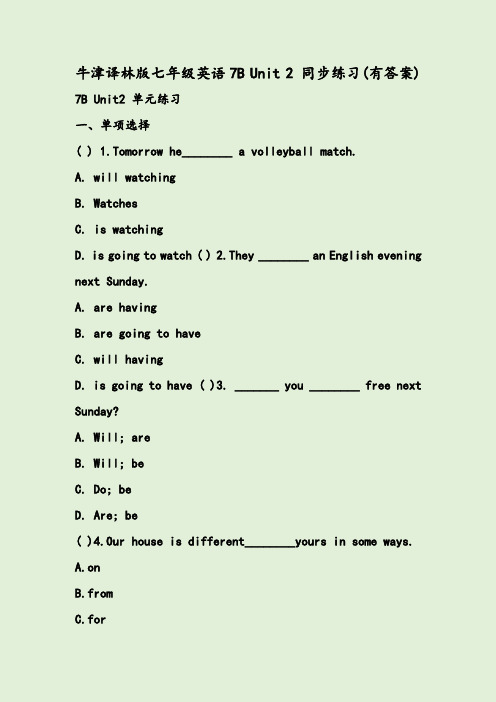
牛津译林版七年级英语7B Unit2同步练习(有答案) 7B Unit2单元练习一、单项选择()1.Tomorrow he________a volleyball match.A.will watchingB.WatchesC.is watchingD.is going to watch()2.They________an English evening next Sunday.A.are havingB.are going to haveC.will havingD.is going to have()3._______you________free next Sunday?A.Will;areB.Will;beC.Do;beD.Are;be()4.Our house is different________yours in some ways.A.onB.fromC.forD.in()5.Amy with Simon________going to play basketball.A.areB.willC.isD.am()6.His brother________a room________him.A.share...withB.shares...withC.share...atD.shares...at()7.Our teacher asks us________English every day.A.readB.readsC.to readD.reading()8.There isn’t________wrong with my computer.A.somethingB.anythingC.someD.Any()9.What about______our party?A.beginsB.beginningC.beginD.to begin()10.There are________animals in the zoo,aren’t there?A.a kind ofB.many kind ofC.many kindsD.many kinds of()11.His mother_______about him every day.A.worryB.worriedC.worriesD.to worry()12.It_________me five minutes to walk to school.A.spendsB.takesC.costsD.pays二、完形填空We can see many animals,like rabbits,bees,dogs,birds, sheep…Do you know__1__these animals say things?When a rabbit sees something___2__,it runs away at once.When it runs,__3__tail moves up and down.When others see this,they run away__4__.Many other animals use this kind of__5__.The bee likes going out to look for food.It flies back home after __6__some food.It cannot tell the other bees where the food is by speaking to them.Instead,it dances in the air. Then the__7__bees know where the food is.Some animals say things by__8__sounds.A dog__9__when it sees a stranger.Some birds can make several differentsounds.Each one__10__its own meaning.Now we know every animal has its own language.()1.A.how B.when C.why D.where()2.A.interesting B.dangerous C.near it D.danger ()3.A.it B.its C.it’s D.its’()4.A.quickly B.also C.either D.back()5.A.jumping B.shouting C.running nguage ()6.A.looks for B.looking for C.finds D.finding ()7.A.another B.other C.others D.else()8.A.make B.makes C.making D.made()9.A.barks B.speaks C.says D.talks()10.A.have B.having C.had D.has三、用所给词的适当形式填空1.My(old)brother works in a restaurant as a cook.2.On Saturdays I often go to___________(help)Hands Club.3.Can you find a volunteer__________(fix)my computer?4.Look,my father____________(fix)his car under the tree.5.He is a good boy and always ready___________(help) others.6.I________(ask)my mother for help with my homework this evening7.__________(check)the plates carefully before you buy it.8.Where____________we__________________(meet) tomorrow?9.I think our team____________(win)the football match next week10.I hope it______________(not rain)this Sunday.四、完成句子1.明天我们将要开车去紫金山吗?________we_________ ___________Zijin Mountain tomorrow?2.后天你准备去做什么?What________you______________________________ _________day_____________?3.我们正在等待你的到来?We are________________you.4.那个女孩正在为晚会穿什么发愁。
牛津译林版7B Unit2基础易错题巩固和拓展提优训练部分答案
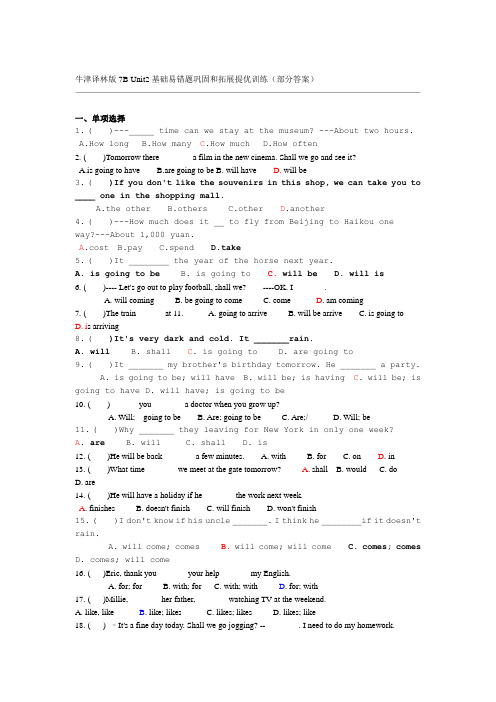
牛津译林版7B Unit2基础易错题巩固和拓展提优训练(部分答案)一、单项选择1.( )---_____ time can we stay at the museum? ---About two hours.A.How longB.How manyC.How muchD.How often2.( )Tomorrow there _______ a film in the new cinema. Shall we go and see it?A.is going to haveB.are going to be B. will have D. will be3.( )If you don't like the souvenirs in this shop, we can take you to ____ one in the shopping mall.A.the otherB.othersC.otherD.another4.( )---How much does it __ to fly from Beijing to Haikou oneway?---About 1,000 yuan.A.costB.payC.spendD.take5.( )It ________ the year of the horse next year.A. is going to beB. is going toC. will beD. will is6.( )---- Let's go out to play football, shall we? ----OK. I _______.A. will comingB. be going to comeC. comeD. am coming7.( )The train ______ at 11. A. going to arrive B. will be arrive C. is going toD. i s arriving8.( )It's very dark and cold. It _______rain.A. willB. shallC. is going toD. are going to9.( )It _______ my brother's birthday tomorrow. He _______ a party.A. is going to be; will haveB. will be; is havingC. will be; is going to haveD. will have; is going to be10.( ) ______ you _______ a doctor when you grow up?A. Will; going to beB. Are; going to beC. Are;/D. Will; be11.( )Why _______ they leaving for New York in only one week?A. areB. willC. shallD. is12.( )He will be back _______ a few minutes. A. with B. for C. on D. in13.( )What time _______ we meet at the gate tomorrow? A. shall B. would C. doD. are14.( )He will have a holiday if he _______ the work next week.A. finishesB. doesn't finishC. will finishD. won't finish15.( )I don't know if his uncle _______. I think he ________if it doesn't rain.A. will come; comesB.will come; will comeC. comes; comesD. comes; will come16.( )Eric, thank you_______ your help_______ my English.A. for; forB. with; forC. with; withD. for; with17.( )Millie, _______ her father, _______ watching TV at the weekend.A. like, likeB. like; likesC. likes; likesD. likes; like18.( ) –It's a fine day today. Shall we go jogging? --________. I need to do my homework.A. Have a nice timeB. Not at allC. Good ideaD. I am afraid not.19.( ) ______worried about me, Mom. I can look after myself. A. Don't B. Don't be C.Not D. Not be20.( )一________ I finish my Maths exercises today? 一No, you _______.A. Must; mustn'tB. Need; needC. Must; don't have toD. Need; don't二、用所给动词的适当形式填空1.Kitty_______(return) to school the day after tomorrow.2.We _______(meet) at the school gate at 8 a.m. tomorrow, shan't we?3.It's so sunny. I don't think it ___________(rain).4.----- _______Jim _______(join) in the next basketball match? ---- Of course he is.5.---- ______ you ________(arrive) at the airport soon? ----- Yes, of course.6.There are too many black clouds in the sky. I ________(take) my umbrella with me.7.There __________(be)a volleyball match in our playground this afternoon.8.He _________(want) to be a teacher when he grows up.9.What special ______________(技能) do you have, Simon?10.There is a man _____________(修理) his car by the road.11.Can you help me to work out the math ____________(难题)?12.---Who ___________(speak) at the meeting tomorrow? ---Maybe Mr Li is. 8/ 1牛津译林版7B Unit2基础易错题巩固和拓展提优训练(部分答案)13.All of us should learn how _________(help) each other in a neighbourhood.14.My brother, like my parents, ___________(enjoy) singing songs very much.15.Please tell him __________(not be) late for the school trip tomorrow.16.I nternet bars mustn't let peo ple under 18 in or let anybody___________(watch) bad things.17.---Where is Stephen? ---Oh, he together with his friends____________(sit) on the sofa, watching TV.18.W ould you please _____________ ( not turn ) off the light?19.I hope it_______ (not rain) tomorrow.20.Alice goes out of the room without ______________ (注意) the small bottle on the table.三、句型练习Kate will return to Nanjing in a week.(对划线部分提问) _______ ________ will Kate return to Nanjing?Let's find someone to fix this broken computer.(完成反意疑问句)Let's find someone to fix this broken computer, ________ _________? Where shall we have a big farewell party? (改为同义句)Where _______ we _______ ________ have a big farewell party.Where will you spend your holiday? (改为同义句)Where are you ____ ____ your holiday绝大部分的孩子都乐于助人。
牛津译林版七年级英语上册 Unit2_课后巩固提升训练
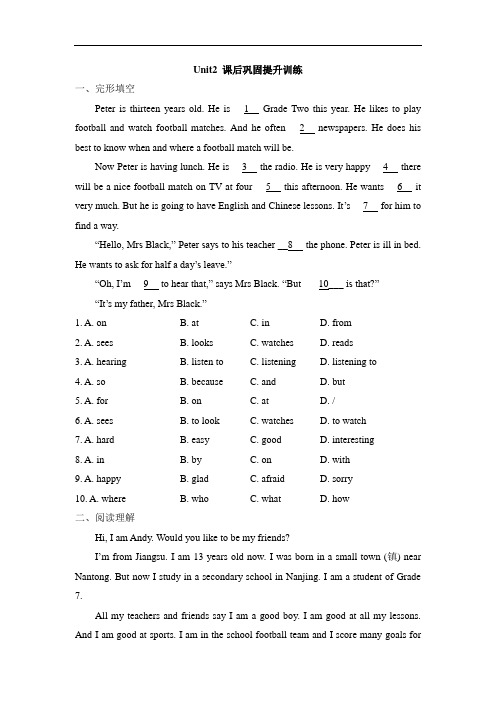
Unit2 课后巩固提升训练一、完形填空Peter is thirteen years old. He is __1__ Grade Two this year. He likes to play football and watch football matches. And he often __2__ newspapers. He does his best to know when and where a football match will be.Now Peter is having lunch. He is __3__ the radio. He is very happy __4__ there will be a nice football match on TV at four __5__ this afternoon. He wants __6__ it very much. But he is going to have English and Chinese lessons. It’s __7__ for him to find a way.“Hello, Mrs Black,” Peter says to his teacher __8__ the phone. Peter is ill in bed. He wants to ask for half a day’s leave.”“Oh, I’m __9__ to hear that,” says Mrs Black. “But ___10___ is that?”“It’s my father, Mrs Black.”1. A. on B. at C. in D. from2. A. sees B. looks C. watches D. reads3. A. hearing B. listen to C. listening D. listening to4. A. so B. because C. and D. but5. A. for B. on C. at D. /6. A. sees B. to look C. watches D. to watch7. A. hard B. easy C. good D. interesting8. A. in B. by C. on D. with9. A. happy B. glad C. afraid D. sorry10. A. where B. who C. what D. how二、阅读理解Hi, I am Andy. Would you like to be my friends?I’m from Jiangsu. I am 13 years old now. I was born in a small town (镇) near Nantong. But now I study in a secondary school in Nanjing. I am a student of Grade 7.All my teachers and friends say I am a good boy. I am good at all my lessons. And I am good at sports. I am in the school football team and I score many goals forthe team. I play football for half an hour every day. So I am strong. I like helping others. I have many friends.I want some online friends (网友).My QQ number is2987424.I don’t get online (上网) on weekdays. I often get online on Saturday afternoons.Would you like to be my friends and chat with me? We will have lots of fun to share (分享).1. Andy now studies in ______.A. a small cityB. a small town near JiangsuC. Grade 8D. a secondary school in Nanjing2. Andy plays football for _______ every day.A. half an hourB. three hoursC.an hourD. four hours3. Andy usually gets online _________.A. on Saturday afternoonsB. on Sunday afternoonsC. on Saturday morningsD. on Sunday mornings4. 2987424 is Andy’s ._______.A. telephone numberB. QQ numberC. e-mail address(地址)D. home number5. Which of the following is NOT true?A. Andy is a helpful boy.B. Andy is good at playing football.C. Andy often gets online.D. Andy has many friends at school.三、阅读下面的对话,根据所给的首字母提示,用合适的单词填空Eric: Hello, Daniel! Do you have much to do at the w__1 __?Daniel: I don’t have much to do on Saturday and Sunday. I am f__2__.Eric: So w__3__ do you often do to kill(消磨) the time.Daniel: I play basketball. I e__4__ it very much.Eric: Who do you often play w__5__?Daniel: Some of my classmates. We are in a team. Basketball makes us f__6__ great. Eric: Boys all like basketball. What e__7__ do you do?Daniel: I sometimes play tennis with my mother, too. She thinks tennis is f__8__.Eric: Really? I like tennis, too. And I often d__9__ of being a good tennis player. Can I go to play with you?Daniel: Of c__10__.1._________2._________3._________4._________5._________5._________ 7._________ 8._________ 9._________ 10._________参考答案及解析一、1. C 在年级、班级前用介词in。
译林牛津7Bunit2全套教案
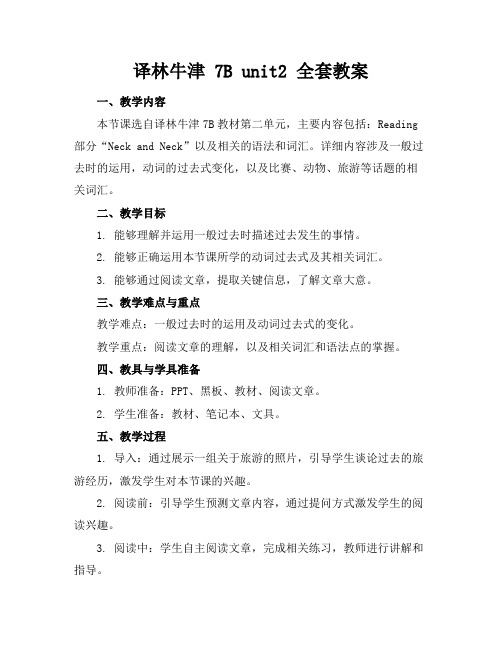
译林牛津 7B unit2 全套教案一、教学内容本节课选自译林牛津7B教材第二单元,主要内容包括:Reading 部分“Neck and Neck”以及相关的语法和词汇。
详细内容涉及一般过去时的运用,动词的过去式变化,以及比赛、动物、旅游等话题的相关词汇。
二、教学目标1. 能够理解并运用一般过去时描述过去发生的事情。
2. 能够正确运用本节课所学的动词过去式及其相关词汇。
3. 能够通过阅读文章,提取关键信息,了解文章大意。
三、教学难点与重点教学难点:一般过去时的运用及动词过去式的变化。
教学重点:阅读文章的理解,以及相关词汇和语法点的掌握。
四、教具与学具准备1. 教师准备:PPT、黑板、教材、阅读文章。
2. 学生准备:教材、笔记本、文具。
五、教学过程1. 导入:通过展示一组关于旅游的照片,引导学生谈论过去的旅游经历,激发学生对本节课的兴趣。
2. 阅读前:引导学生预测文章内容,通过提问方式激发学生的阅读兴趣。
3. 阅读中:学生自主阅读文章,完成相关练习,教师进行讲解和指导。
4. 阅读后:学生进行小组讨论,讨论文章中的关键信息,进行角色扮演等活动。
5. 语法讲解:教师讲解一般过去时及动词过去式的变化规则,并进行例句展示。
6. 随堂练习:设计相关练习题,让学生巩固所学知识。
六、板书设计1. Neck and Neck2. 重点词汇:比赛、动物、旅游等话题词汇;一般过去时;动词过去式3. 主要句子:文章中的关键句型;一般过去时的句子示例七、作业设计1. 作业题目:(1)根据课文内容,完成填空题。
(2)运用一般过去时,编写一段关于自己过去旅游经历的小故事。
2. 答案:八、课后反思及拓展延伸1. 课后反思:教师应关注学生在课堂上的表现,及时发现问题,调整教学方法,提高教学效果。
2. 拓展延伸:鼓励学生在课后进行更多关于一般过去时的练习,提高英语实际运用能力。
同时,引导学生关注现实生活中的相关话题,激发学习兴趣。
牛津译林版英语7bunit2单元练习有答案(七年级)

7B Unit3 Welcome to Sunshine Town一、根据括号中所给的汉语和句意写出单词1. She is a good friend of ________________(我的).2. England is a __________________(西方的)country .3. On Sundays, there are many ______________(购物者)in the shopping malls.4. What a ________________(晴朗)day!Let’s go out for a walk.5. You can go to a ________________(剧院)to enjoy Beijing Opera.6. My favourite sport is _______________(羽毛球).7. How much dog food can Eddie buy ________________(用)one yuan?8. Let’s ______________(点) a pizza, shall we?9. Jack got up so late that he _______________(错过)the last train.10. Your hands look so _________________(脏的). Go and wash them.二、根据中文写出下列短语1. 在电冰箱里2. 喜欢打羽毛球______________________3. 去电影院4. 乘地铁____________________________5. 较少的空气污染6. 我们中大多数人____________________7. 例如8. 需要帮助做回家作业________________9. 选择你喜欢的任何食物10. 没关系___________________________11. 为什么不做某事12. 一个居住的好地方_________________13. 交流学生14. 属于_____________________________15. 带领某人参观某地_____________________三、单项选择( )1. Let us take ______ to the shopping mallA. themB. themselvesC. theirsD. their( )2. How much ______ is there on the table?A. meatsB. meatC. eggsD. egg( )3. _______ of the answers is right.A. NoB. NoneC. NotD. Every( )4. The pollution here ______ becoming more and more serious.A. amB. isC. areD. be( )5. Thanks for _______ me.I really need your ______.A. helping;helpB. help;helpC. helping;helpD. helping; helping ( )6. There is a famous park here.______ name is Xuanwu Park.A. MyB. HerC. HisD. Its( )7. There are many ______ in Xi’an.A. interesting placeB. interesting placesC. places of interestingD. place of interest( )8. _______ in my class is good at writing.A. NoB. NotC. No oneD. Some( )9. There is ______ “u” and _______ “s” in the word “us”.A. a;aB. an;anC. an;aD. a;an( )10. _______ cartons of milk do you want?A. How manyB. How muchC. What numberD. What四、句子翻译1.约翰将带领我们参观他的家乡。
牛津译林版7B Unit2基础易错题巩固和拓展提优训练(部分答案)
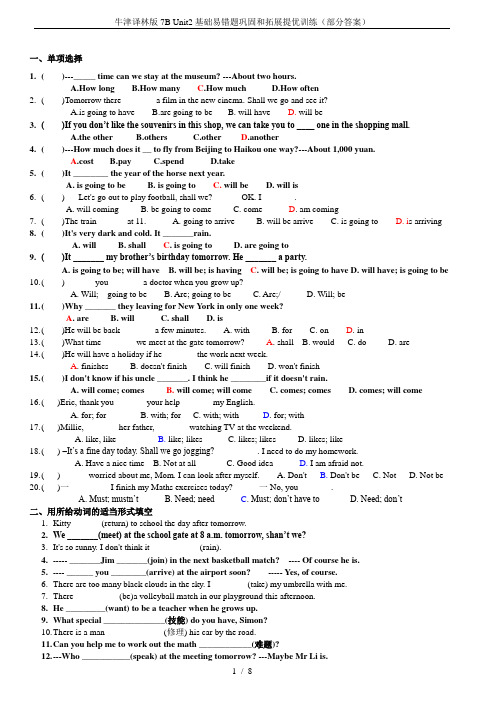
一、单项选择1.( )---_____ time can we stay at the museum? ---About two hours.A.How longB.How manyC.How muchD.How often2.( )Tomorrow there _______ a film in the new cinema. Shall we go and see it?A.is going to haveB.are going to be B. will have D. will be3.( )If you don’t like the souvenirs in this shop, we can take you to ____ one in the shopping mall.A.the otherB.othersC.otherD.another4.( )---How much does it __ to fly from Beijing to Haikou one way?---About 1,000 yuan.A.costB.payC.spendD.take5.( )It ________ the year of the horse next year.A. is going to beB. is going toC. will beD. will is6.( )---- Let's go out to play football, shall we? ----OK. I _______.A. will comingB. be going to comeC. comeD. am coming7.( )The train ______ at 11. A. going to arrive B. will be arrive C. is going to D. i s arriving8.( )It's very dark and cold. It _______rain.A. willB. shallC. is going toD. are going to9.( )It _______ my brother’s birthday tomorrow. He _______ a party.A. is going to be; will haveB. will be; is havingC. will be; is going to haveD. will have; is going to be10.( ) ______ you _______ a doctor when you grow up?A. Will; going to beB. Are; going to beC. Are;/D. Will; be11.( )Why _______ they leaving for New York in only one week?A. areB. willC. shallD. is12.( )He will be back _______ a few minutes. A. with B. for C. on D. in13.( )What time _______ we meet at the gate tomorrow? A. shall B. would C. do D. are14.( )He will have a holiday if he _______ the work next week.A. finishesB. doesn't finishC. will finishD. won't finish15.( )I don't know if his uncle _______. I think he ________if it doesn't rain.A. will come; comesB. will come; will comeC. comes; comesD. comes; will come16.( )Eric, thank you_______ your help_______ my English.A. for; forB. with; forC. with; withD. for; with17.( )Millie, _______ her father, _______ watching TV at the weekend.A. like, likeB. like; likesC. likes; likesD. likes; like18.( ) –It’s a fine day today. Shall we go jogging? --________. I need to do my homework.A. Have a nice timeB. Not at allC. Good ideaD. I am afraid not.19.( ) ______worried about me, Mom. I can look after myself. A. Don't B. Don't be C. Not D. Not be20.( )一________ I finish my Maths exercises today? 一No, you _______.A. Must; mustn’tB. Need; needC. Must; don’t have toD. Need; don’t二、用所给动词的适当形式填空1.Kitty_______(return) to school the day after tomorrow.2.We _______(meet) at the school gate at 8 a.m. tomorrow, shan’t we?3.It's so sunny. I don't think it ___________(rain).4.----- _______Jim _______(join) in the next basketball match? ---- Of course he is.5.---- ______ you ________(arrive) at the airport soon? ----- Yes, of course.6.There are too many black clouds in the sky. I ________(take) my umbrella with me.7.There __________(be)a volleyball match in our playground this afternoon.8.He _________(want) to be a teacher when he grows up.9.What special ______________(技能) do you have, Simon?10.T here is a man _____________(修理) his car by the road.11.C an you help me to work out the math ____________(难题)?12.---Who ___________(speak) at the meeting tomorrow? ---Maybe Mr Li is.13.A ll of us should learn how _________(help) each other in a neighbourhood.14.M y brother, like my parents, ___________(enjoy) singing songs very much.15.P lease tell him __________(not be) late for the school trip tomorrow.16.I nternet bars mustn’t let peo ple under 18 in or let anybody ___________(watch) bad things.17.---Where is Stephen? ---Oh, he together with his friends ____________(sit) on the sofa, watching TV.18.W ould you please _____________ ( not turn ) off the light?19.I hope it_______ (not rain) tomorrow.20.A lice goes out of the room without ______________ (注意) the small bottle on the table.三、句型练习Kate will return to Nanjing in a week.(对划线部分提问) _______ ________ will Kate return to Nanjing?Let's find someone to fix this broken computer.(完成反意疑问句)Let's find someone to fix this broken computer, ________ _________?Where shall we have a big farewell party? (改为同义句)Where _______ we _______ ________ have a big farewell party.Where will you spend your holiday? (改为同义句)Where are you ____ ____ your holiday绝大部分的孩子都乐于助人。
牛津译林版英语7BUnit2单元练习含答案

7B Unit3 Welcome to Sunshine Town一、依据括号中所给的汉语和句意写出单词1.She is a good friend of ________________( 我的 ).2.England is a __________________( 西方的 )country .3.On Sundays, there are many ______________( 购物者 )in the shopping malls.4.What a ________________( 明朗 )day!Let ’ s go out for a walk.5.You can go to a ________________( 剧院 )to enjoy Beijing Opera.6.My favourite sport is _______________( 羽毛球 ).7.How much dog food can Eddie buy ________________( 用 )one yuan?8. Let’ s( 点 ) a pizza, shall we?9.Jack got up so late that he _______________( 错过 )the last train.10.Your hands look so _________________( 脏的 ). Go and wash them.二、依据中文写出以下短语1. 在电冰箱里2. 喜爱打羽毛球 ______________________3. 去电影院4. 乘地铁 ____________________________5. 较少的空气污染6. 我们中大多半人 ____________________7. 比如8. 需要帮助做回家作业________________9. 选择你喜爱的任何食品10. 没关系 ___________________________ 11. 为何不做某事12. 一个居住的好地方 _________________ 13. 沟通学生14. 属于 _____________________________15. 率领某人观光某地 _____________________三、单项选择( )1. Let us take ______ to the shopping mallA. themB. themselvesC. theirsD. their( )2. How much ______ is there on the table?A. meatsB. meatC. eggsD. egg( )3. _______ of the answers is right .A. NoB. NoneC. NotD. Every ( )4. The pollution here ______ becoming more and more serious .A. amB. isC. areD. be( )5. Thanks for _______ me . I really need your ______ .A. helping ; helpB. help; helpC. helping ; helpD. helping; helping ( )6. There is a famous park here. ______ name is Xuanwu Park .A. MyB. HerC. HisD. Its( )7. There are many ______ in Xi.’ anA. interesting placeB. interesting placesC. places of interestingD. place of interest( )8. _______ in my class is good at writing .A. NoB. NotC. No oneD. Some ( )9. There is ______ “ u” and _______ “ s” in .the word “ us ”A. a ;aB. an; anC. an; aD. a; an ( )10. _______ cartons of milk do you want?A. How manyB. How muchC. What numberD. What四、句子翻译1.约翰将率领我们观光他的家乡。
牛津译林版 英语 7B Unit2 语法一般将来时学案设计+练习(含答案)
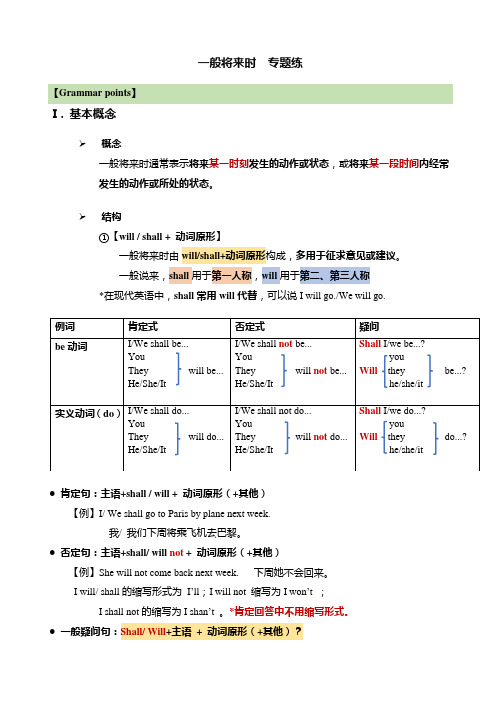
一般将来时专题练【Grammar points】Ⅰ. 基本概念➢概念一般将来时通常表示将来某一时刻发生的动作或状态,或将来某一段时间内经常发生的动作或所处的状态。
➢结构①【will / shall + 动词原形】一般将来时由will/shall+动词原形构成,多用于征求意见或建议。
一般说来,shall用于第一人称,will用于第二、第三人称*在现代英语中,shall常用will代替,可以说I will go./We will go.●肯定句:主语+shall / will + 动词原形(+其他)【例】I/ We shall go to Paris by plane next week.我/ 我们下周将乘飞机去巴黎。
●否定句:主语+shall/ will not + 动词原形(+其他)【例】She will not come back next week. 下周她不会回来。
I will/ shall的缩写形式为I’ll;I will not 缩写为I won’t ;I shall not的缩写为I shan’t 。
*肯定回答中不用缩写形式。
●一般疑问句:Shall/ Will+主语+ 动词原形(+其他)?【例】Will you be at home tonight? 今晚你会在家吗?●特殊疑问句:特殊疑问词+shall/ will+主语+ 动词原形(+其他)?【例】What will you do next weekend? 下周末你将做什么?②【be going to + 动词原形】表示计划、打算做某事,表示已决定的并很可能发生的事。
*be going to相当于一个助动词,与后面的动词原形一起构成谓语be动词的形式随主语的人称和数可变为am,is或are。
●肯定句:主语+be going to + 动词原形...【例】Jack is going to buy a car. 杰克打算买一辆汽车。
译林牛津7Bunit2全套教案精品
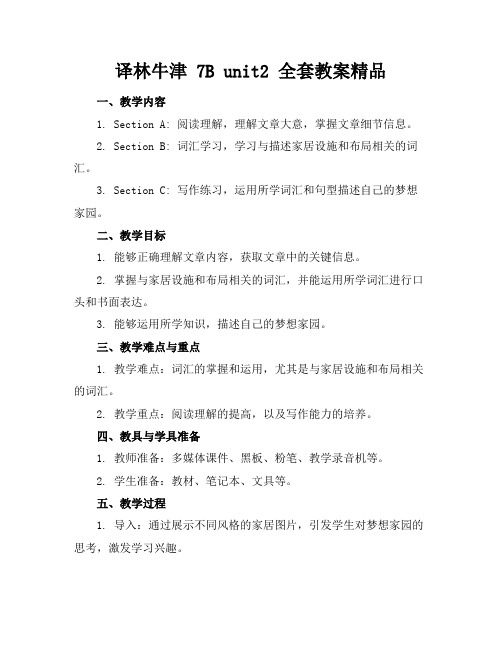
译林牛津 7B unit2 全套教案精品一、教学内容1. Section A: 阅读理解,理解文章大意,掌握文章细节信息。
2. Section B: 词汇学习,学习与描述家居设施和布局相关的词汇。
3. Section C: 写作练习,运用所学词汇和句型描述自己的梦想家园。
二、教学目标1. 能够正确理解文章内容,获取文章中的关键信息。
2. 掌握与家居设施和布局相关的词汇,并能运用所学词汇进行口头和书面表达。
3. 能够运用所学知识,描述自己的梦想家园。
三、教学难点与重点1. 教学难点:词汇的掌握和运用,尤其是与家居设施和布局相关的词汇。
2. 教学重点:阅读理解的提高,以及写作能力的培养。
四、教具与学具准备1. 教师准备:多媒体课件、黑板、粉笔、教学录音机等。
2. 学生准备:教材、笔记本、文具等。
五、教学过程1. 导入:通过展示不同风格的家居图片,引发学生对梦想家园的思考,激发学习兴趣。
2. 阅读理解:学生自主阅读文章,教师提问检查学生对文章大意的理解,针对文章细节进行讲解。
3. 词汇学习:教师引导学生学习与家居设施和布局相关的词汇,通过例句和实物展示帮助学生理解。
4. 口语练习:学生分组讨论,运用所学词汇描述自己的梦想家园。
六、板书设计1. My dream home七、作业设计1. 作业题目:描述你的梦想家园,不少于100词。
八、课后反思及拓展延伸1. 反思:本节课通过实践情景引入、例题讲解和随堂练习,提高了学生的阅读理解能力和写作能力。
但在课堂活动中,要注意关注学生的参与度和互动性,提高课堂氛围。
2. 拓展延伸:鼓励学生在课后通过网络或书籍,了解更多关于家居设计的知识,为下节课的写作练习做好准备。
同时,开展小组活动,让学生互相介绍自己的梦想家园,提高口语表达能力。
重点和难点解析1. 教学难点:词汇的掌握和运用,尤其是与家居设施和布局相关的词汇。
2. 教学重点:阅读理解的提高,以及写作能力的培养。
译林牛津7Bunit2全套教案
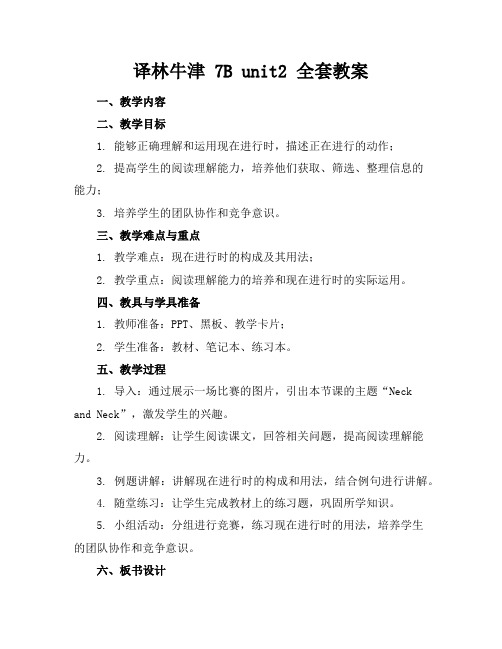
译林牛津 7B unit2 全套教案一、教学内容二、教学目标1. 能够正确理解和运用现在进行时,描述正在进行的动作;2. 提高学生的阅读理解能力,培养他们获取、筛选、整理信息的能力;3. 培养学生的团队协作和竞争意识。
三、教学难点与重点1. 教学难点:现在进行时的构成及其用法;2. 教学重点:阅读理解能力的培养和现在进行时的实际运用。
四、教具与学具准备1. 教师准备:PPT、黑板、教学卡片;2. 学生准备:教材、笔记本、练习本。
五、教学过程1. 导入:通过展示一场比赛的图片,引出本节课的主题“Neck and Neck”,激发学生的兴趣。
2. 阅读理解:让学生阅读课文,回答相关问题,提高阅读理解能力。
3. 例题讲解:讲解现在进行时的构成和用法,结合例句进行讲解。
4. 随堂练习:让学生完成教材上的练习题,巩固所学知识。
5. 小组活动:分组进行竞赛,练习现在进行时的用法,培养学生的团队协作和竞争意识。
六、板书设计1. Reading部分:板书课文“Neck and Neck”,标注重点词汇和短语;2. Grammar部分:板书现在进行时的构成和用法,结合例句展示。
七、作业设计1. 作业题目:(1)用现在进行时描述你正在做的动作;(2)阅读短文,完成相关问题。
2. 答案:(1)I am eating dinner with my family.(2)答案见教材。
八、课后反思及拓展延伸2. 拓展延伸:鼓励学生在课后观察生活中正在进行的动作,用现在进行时进行描述,并分享给同学。
可以布置一篇关于比赛的作文,让学生运用所学知识进行创作。
重点和难点解析1. 现在进行时的构成和用法;2. 阅读理解的技巧和方法;3. 教学过程中的实践情景引入、例题讲解和随堂练习;4. 板书设计;5. 作业设计和课后拓展延伸。
详细补充和说明:一、现在进行时的构成和用法重点和难点解析:现在进行时的构成是“主语 + be动词(am/is/are) + 动词的现在分词”,表示正在进行的动作或状态。
初中英语 译林七下第二单元同步教案(带有同步练习题(含答案))
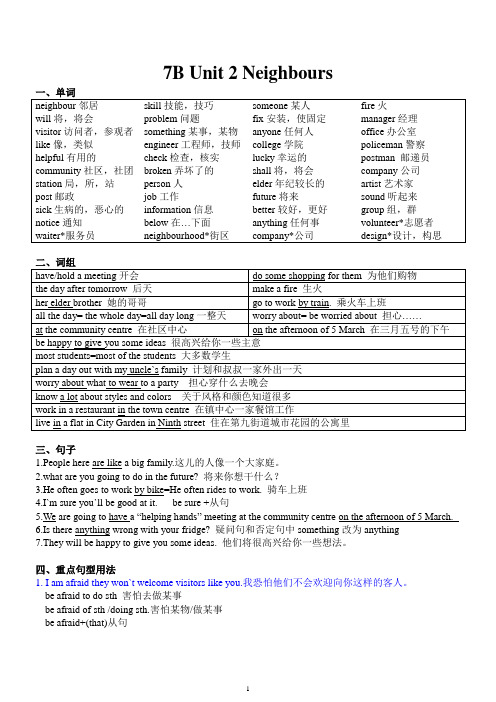
7B Unit 2 Neighbours三、句子1.People here are like a big family.这儿的人像一个大家庭。
2.what are you going to do in the future? 将来你想干什么?3.He often goes to work by bike=He often rides to work. 骑车上班4.I`m sure you`ll be good at it. be sure +从句5.We are going to have a “helping hands” meeting at the community centre on the afternoon of 5 March.6.Is there anything wrong with your fridge? 疑问句和否定句中something改为anything7.They will be happy to give you some ideas. 他们将很高兴给你一些想法。
四、重点句型用法1. I am afraid they won`t welcome visitors like you.我恐怕他们不会欢迎向你这样的客人。
be afraid to do sth 害怕去做某事be afraid of sth /doing sth.害怕某物/做某事be afraid+(that)从句I’m afraid so.恐怕是的。
I’m afraid not. 恐怕不是这样的。
welcome sb. 欢迎某人welcome to sp.欢迎来到某地like (prep)像He, _______his elder brother, likes chatting with others.2.It`s good to live in a neighbour like that. 住在那样一个小区很好。
7B Unit2 Neighbours知识总结和配套练习

7B Unit2 Neighbours知识总结和配套练习单元重点知识点总览词汇/句型1.neighbour n.邻居2.meet(1)vt.遇见,碰见I met him in the street.(2)vt.迎接Will you meet her at the station?[拓展]Meet with 偶然遇见On my way home, I met with an old friend.3.afraid adj.害怕,畏惧(1)be afraid to do sth害怕做某事I‟m afraid to go out alone at night.(2)be afraid of doing sth害怕……I‟m afraid of falling into the river.(3 )be afraid that从句,表示恐怕……I‟m afraid that I can‟t help you.4.readybe ready to do sth=be willing to do sth 乐意做某事He is always ready to help others.他总是乐意帮助他人。
5.volunteer n志愿者V志愿做(常与to连用)We all volunteered to paint the house.6.luck名词good luck to sb; good luck with sthlucky形容词You‟re a lucky dog.你是个幸运的家伙。
luckily副词Luckily, we passed the exam.7.do some+v.-ingdo some reading do some shoppingdo some washing do some cooking8.old与elderold指年老的;旧的elder指年长的elderly上了年纪的My younger son is four and my elder son is six.The+adj表示一类人the old 老年人9.in the future 将来,通常指将来的某一时间in future 从今以后,指全部的将来。
牛津译林版七年级英语下册7B Unit 2 课时练习(含答案)

7B Unit2 Comic strip&Welcome to the unit课时练习一、根据句意及汉语或首字母提示,写出单词。
1. Jack is my new ________ (邻居). He is very friendly.2. These ________ (参观者) will visit the Great Wall this afternoon.3. You are too lazy. I think you should study hard ________ (像) Jack.4. He ________ (将会) buy a new computer next week.2. Lily is a ________. She goes to the hospital at six every morning.3. They are ________. They work in a restaurant.4. ________ of the students in our class come from Beijing.5. I have too much homework to do. I am _______ I can’t go shopping with you.6. Jack’s father is a good ________. He can cook delicious food.7. Mr. Wu is a ________. He teaches in No.6 Middle School.8. ________ to our school. I will show you around it.三、对划线部分提问,每空一词。
1. The building has 15 floors.________ ________ ________ ________ the building ________?2. My father is a waiter.________ ________ ________ father?3. Jack lives in a flat in City Garden in Ninth Street.________ ________ Jack ________?4. They have supermarkets, restaurants, a school and a hospital around their neighbourhood.________ ________ they ________ around their neighbourhood?5. I will go fishing next week.________ ________ you ________ next week?6. I am going to buy a new computer this afternoon.________ ________ you ________ ________ ________ this afternoon?四、根据汉语意思完成句子,每空一词。
牛津译林版7B-Unit2-知识点总结与练习
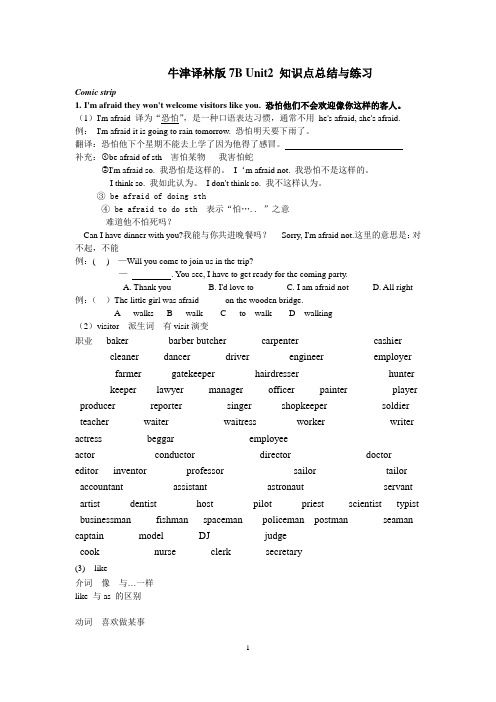
牛津译林版7B Unit2 知识点总结与练习Comic strip1.I'm afraid they won't welcome visitors like you. 恐怕他们不会欢迎像你这样的客人。
(1)I'm afraid 译为“恐怕”,是一种口语表达习惯,通常不用he's afraid, she's afraid. 例:I'm afraid it is going to rain tomorrow. 恐怕明天要下雨了。
翻译:恐怕他下个星期不能去上学了因为他得了感冒。
补充:①be afraid of sth 害怕某物我害怕蛇②I'm afraid so. 我恐怕是这样的。
I‘m afraid not. 我恐怕不是这样的。
I think so. 我如此认为。
I don't think so. 我不这样认为。
③ be afraid of doing sth④ be afraid to do sth 表示“怕….. ”之意难道他不怕死吗?---Can I have dinner with you?我能与你共进晚餐吗?--- Sorry, I'm afraid not.这里的意思是:对不起,不能例:( ) —Will you come to join us in the trip?— . You see, I have to get ready for the coming party.A. Thank youB. I'd love toC. I am afraid notD. All right 例:()The little girl was afraid _____ on the wooden bridge.A walksB walkC to walkD walking(2)visitor 派生词有visit演变职业baker barber butcher carpenter cashier cleaner dancer driver engineer employerfarmer gatekeeper hairdresser hunterkeeper lawyer manager officer painter player producer reporter singer shopkeeper soldier teacher waiter waitress worker writer actress beggar employeeactor conductor director doctor editor inventor professor sailor tailor accountant assistant astronaut servant artist dentist host pilot priest scientist typist businessman fishman spaceman policeman postman seaman captain model DJ judgecook nurse clerk secretary(3)like介词像与…一样like 与as 的区别动词喜欢做某事2.Most of them have 14 floors.大多数楼有14层。
译林牛津7bunit2全套教案

Main pointsandDifficult points:
Talk about the students’ own dream homes.
Teaching Procedures:
Teacher’s Activities
3. Complete Part C, C1, on page 29. Show the slide
If it is wrong, ask the Ss to correct it.
Homework
1) Read the article after class and find out the difficult sentences.
they hungry?
2. Is there any food left?
3. How much money do they have?
4. Where does Eddie want to do with one yuan?
Step 4. Activity
Prepare one or two minutes then act it out in pairs.
2) Complete Part B (B1 & B2), Part C2.
Work in pairs.
Learn the new words and phrases that will come out in this lesson.
Ask and answer in pairs.
With this questions and read the passage quickly to find out the answers:live shop eat study enjoy
- 1、下载文档前请自行甄别文档内容的完整性,平台不提供额外的编辑、内容补充、找答案等附加服务。
- 2、"仅部分预览"的文档,不可在线预览部分如存在完整性等问题,可反馈申请退款(可完整预览的文档不适用该条件!)。
- 3、如文档侵犯您的权益,请联系客服反馈,我们会尽快为您处理(人工客服工作时间:9:00-18:30)。
七年级下册 Unit 2 Neighbours二、重点词组、句型用法1. I am afraid they won`t welcome visitors like you.我恐怕他们不会欢迎向你这样的客人。
be afraid+(that)从句害怕……be afraid to do sth 害怕去做某事 be afraid of sth /doing sth.害怕某物/做某事welcome sb. 欢迎某人 welcome to sp.欢迎来到某地like (prep)像 He, _______his elder brother, likes chatting with others.I’m afraid so.恐怕是的。
恐怕不是这样的:。
2.It`s good to live in a neighbour like that. 住在那样一个小区很好。
It`s+ (形容词/副词)(to do/doing)sth 如何翻译?3.What are your neighbours like?= How are you neighbours?你的邻居们(性格品质)如何?What be sb/sth like?你认为…怎么样(性格品质)?(用(哪种词)回答?)What do/does sb. like? 某人喜欢什么?What do/does sb. look like? 某人长什么样子(外貌)?4. They often meet at the community centre and share their different skills.different +名词(单/复)数5.Some of them are volunteers.他们中有一些人是志愿者。
some/most/all of +名词/代词(名词前有限定词) one of +复数表示“……之一”Most of the water (is/are) for drinking. 大多数水都是用来喝的。
Most of the students in our class (is/are) boys. 我们班大多数学生是男生。
(注意主谓一致)6.They help us with all kinds of problems. 他们帮助我们解决各种各样的问题。
help sb.(to) do sth.帮助某人去做某事 help sb. with sth. 在某方面帮助某人with the help of sb 在某人的帮助之下 without one`s help没有某人的帮助helpful adj.乐于助人的all kinds of 各种各样的 different kinds of 不同种类的7. There`s something wrong with my computer. = My computer is broken.= My computer doesn’t work.=My computer isn’t working. 我的电脑坏了。
something 指物的不定代词,“某事,某物”,看作单数。
形容词修饰不定代词要后置,不定式修饰不定代词要后置要后置。
翻译:一些奇怪的事情 : .一些有趣的事情: .一些吃的: .注:would you like /could you /can I结构还用something, 表委婉语气,或希望得到肯定回答。
思考:其他的不定代词:someone/somebody anyone/anybody/anything everyone/everybody/everythingnobody(=no one)/nothing 各为什么含义。
8.I want to help sick people.我想要帮助生病的人sick可修饰名词,ill 也表示生病的,但不能修饰名词,只能用“The little boy is ill.”9.That sounds like a good idea. 那听起来像是个好主意。
(That sounds good!)sound like +名词词组听起来像…… look like …看起来像……sound( 起来)/look(起来)/feel()/smell 起来)/taste(起来)/become( ),以及be动词,都是动词家族中较特殊的一类词,叫做“联系动词”,一般后接 (形容词/副词),而大多数行为动词要用副词来修饰。
eg. They look cool!他们看起来很酷!音乐听起来很美妙! . 10.Some college students are ready to help.一些大学生乐于帮忙。
be ready sth. 准备/乐于做某事 be ready for sth 为……做好准备eg. We are ready for the coming exams.我们为接下来的考试做好了准备。
请为你的课程(course)做好准备 .get ready强调动作,be ready 强调“已经准备好了”的状态。
11. Are you worrying about what to wear to a party or how to design your home?worry about sth/sb 特殊疑问词+ sth①I don`t know who _________(ask) for help.②Do you know when __________(start)?12. Are you not feeling well these days? 你最近觉得不舒服吗?I’m not feeling well.= I don’t feel well. “well”此处是 (形容词/副词),表示身体好的。
13.They will make you feel better!他们会让你好起来。
make sb. sth. 让某人做某事 make +宾语+adj. 使……觉得……eg. Our teachers make us .A:stop talking B:stop to talking C:stop talk D:stoping talkThe exciting news makes hime (feel) excited.14.When people do not know what to wear to a party or how to design their home, the artists will give them some ideas. 当人们不知道该穿什么去派对或者如何去设计自己的家,这些艺术家们将会给他们一些点子。
“特殊疑问词+动词不定式”可做宾语或主语,是对一个句子的省略,此处“what to wear”相当于“what they should/can wear”。
三、语法复习simple future tense with will and shall一般将来时1.当将来一定会发生的事或已经计划好的事用will. We will have a charity show next week.2. be going to更侧重于计划打算或很快就要发生的事。
It is so cloudy. I think it is going to rain.①There ___________a football match in our school next week.A. is going to haveB. will haveC. is going to be D are going to be②It _________my brother’s birthday tomorrow. He ________a party.A. is going to be; hasB. will be; is havingC. will be; is going to haveD. will have; is going to be③How cold now! I think it ___________(rain).3.there be句型的一般将来时“there will be ……/there is(are)going to be……”4..shall可用语第一人称I/we, 替代will表示一般将来时,但shall更多用来表示建议。
eg.Shall we take a bus there? 我们能坐汽车去那儿吗?5.常用的时间状语:tomorrow明天,tomorrow morning/afternoon,the day after tomorrow后天,next week/month/Sunday/year,in the future在将来,“in+一段时间”表示“多久以后”,in 2020在2020年四、四会内容一、重要词组1.live in a flat in City Garden in Ninth street 住在第九街道城市花园的公寓里2.most students=most of the students 大多数学生3.have/hold a meeting 开会4.do some shopping for them 为他们购物 do some washing/reading/cleaning5.plan a day out with my uncle`s family 计划和叔叔一家外出一天6.the day after tomorrow 后天7.make a fire 生火8.work in a restaurant in the town centre 在镇中心一家餐馆工作9.her elder brother 她的哥哥11.go to work . 乘火车上班 by +交通工具12.at the community centre 在社区中心13.on the afternoon of 5 March 在三月五号的下午 on Monday afternoon/morning14.worry about what to wear to a party 担心穿什么去晚会15. all the day= the whole day=all day long17.know a lot about styles and colours 关于风格和颜色知道很多18.be happy to give you some ideas 很高兴给你一些主意19. worry about= be worried about 担心……二、重要句子1.People here are like a big family.( like 为介词,像)这儿的人像一个大家庭。
